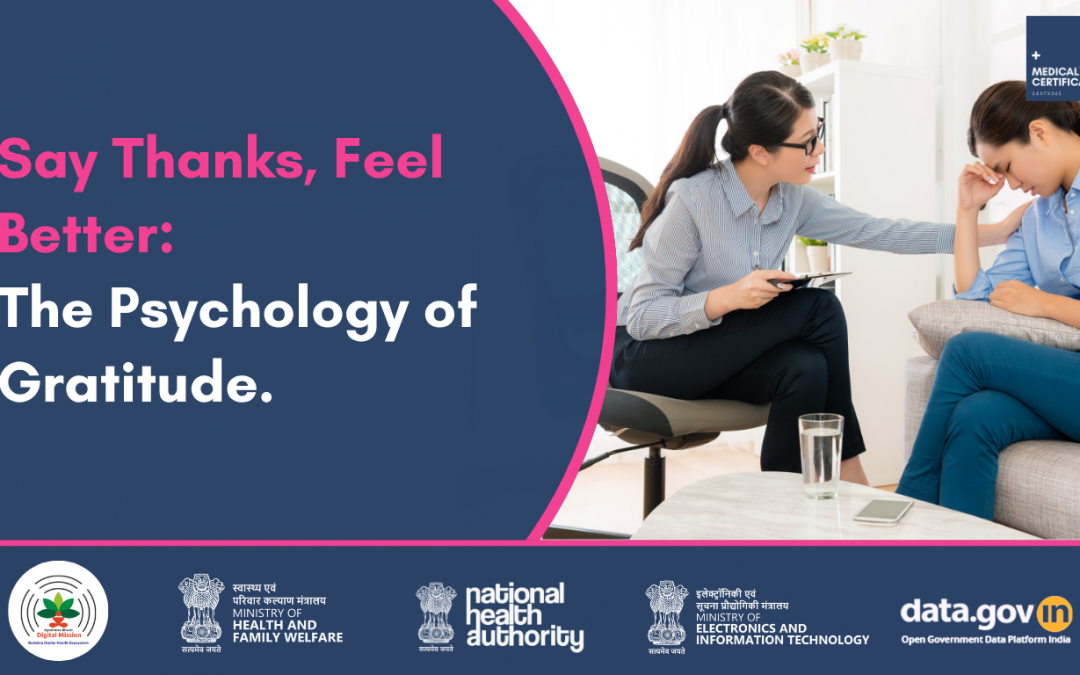We’ve all heard the cliche “Be thankful for what you have.” It’s pleasant, perhaps even a bit cheesy. But what if thankfulness is more than just a social nicety or a pious recitation of blessings? What if it’s something greater; what if it’s something a mighty, science-supported tool that can actually recondition the operation of your brain and heal your mind?
Gratitude isn’t just a warm fuzzy feeling it’s a mindset, a habit, and a form of emotional intelligence. In this blog, we’ll explore the science behind gratitude, how it influences mental well-being, and practical ways to bring more of it into your life even on the hardest days.
What Is Gratitude, Really?
Gratitude is something greater than saying a “thank you.” Essentially, it’s a positive emotional reaction we get when we notice something good in our life—usually from somewhere else. It might be when we say thank you to a friend for being kind, thank the universe for wellness, or just appreciate the view of a sunset.
It’s not about not wanting to notice the negativity of life. It’s more about noticing the positive in spite of the negatives. Gratitude assists in diverting attention from what we don’t have and instead focusing on what counts.
The Science: What Occurs in the Brain When You’re Thankful?
Lastly, the interesting part. Neuroscientific studies tell us that gratitude produces quantifiable effects on the brain:
1. Stimulates the Brain’s Reward System
When you feel grateful, your brain engages the medial prefrontal cortex, which is linked to learning, decision-making, and reward processing. fMRI scans indicate that practicing gratitude engages this area, consolidating positive behavior and feeling.
2. Strengthens Dopamine and Serotonin
Gratitude has been known to boost dopamine, the “feel-good” neurotransmitter, and serotonin, mood stabilizer. It’s like the brain response to antidepressant medication—naturally, and without side effects.
3. Lowers Stress Hormones
Practicing gratitude lowers cortisol, the stress hormone. In a study, one group of participants kept a gratitude journal and had 23% lower cortisol levels compared to a group that did not keep a gratitude journal.
4. Makes Stronger Neural Pathways
Similar to learning something new, practicing gratitude continuously reshapes your brain to create stronger pathways for hope, resilience, and emotional control.
“Okay, But Does Gratitude Really Make You Happier?”
Yes—and the science backs it up.
In a landmark 2003 study by psychologists Michael McCullough and Robert Emmons, volunteers who wrote down what they were grateful for once a week were reported to be more optimistic, sleeping better, and complaining less of health ailments than those who wrote down daily hassles.
Even more recent studies done at Harvard Medical School affirm that gratitude has a strong connection with increased happiness, less depression, and healthier relationships.
And here’s the best part: You don’t need to make any drastic changes in your life to feel grateful. Just noticing the little things—a good meal, a gentle word, a few moments of peace—can pay off in the long run.
Gratitude Around the World
Gratitude is not just a psychological phenomenon—it’s a part of religions and cultures.
- In Japan, people say “Itadakimasu” to their food and the ones who prepared it in appreciation before they eat.
- In Native American traditions, thankfulness is often expressed to Earth, animals, plants, and ancestors in ceremonies and tales.
- In Hindu and Buddhist traditions, gratitude is a fundamental practice that brings about humility and inner peace.
This cross-cultural presence suggests one thing: Gratitude may be part of what makes humans human.
But What If You Don’t Feel Grateful?
It’s also worth mentioning that developing gratitude does not come naturally to most people—particularly those who are suffering with mental illness such as depression, anxiety, or trauma. Gratitude is not toxic positivity or pretending everything is fine. It’s grasping something—however small—to hold on to.
If your brain automatically brushes off what’s going wrong when you attempt to be grateful, you’re not doing something awful. You’re human. Gentle persistence and not perfection is the solution.
Begin small:
- “I’m thankful that I was able to get myself out of bed this morning.”
- “I’m thankful for the tea.”
- “I’m thankful that I had a moment of quiet before anarchy set in.”
It is little things that can begin to change the emotional weather inside your brain.
How to Build a Gratitude Practice (Without It Feeling Fake)
Building a gratitude habit doesn’t require hours of meditation or a perfectly curated journal. Here are some science-backed, low-effort ways to bring gratitude into your routine:
1. Keep a Gratitude Journal
Spend 2–5 minutes a day writing down 3 things you’re grateful for. Try to vary them daily. Studies show this boosts well-being and reduces symptoms of depression.
2. Say It Out Loud
No matter if you are thanking a coworker, family member, or barista—saying your thanks out loud bridges and reinforces those neural connections in your brain.
3. Utilize Visual Reminders
Post-it notes, phone backgrounds, or morning alarm reminders can keep you aware and get you to pause and reflect. This “cue-based gratitude” ingrains the habit.
4. Gratitude Letter or Message
Write a note or letter to someone who has made an impact in your life. Whether or not you send it, the act of writing makes you stronger emotionally.
5. Mindful Moments
The next time you go for a walk, have a meal, or hold someone close to your heart, slow down and really enjoy the moment. Being present enhances your gratitude capacity.
Gratitude Is a Practice, Not a Personality Trait
You don’t have to be an innate optimist to practice gratitude. Consider flossing—one of the dullest things you’ll ever do, but absolutely indispensable for long-term overall health. Gratitude is a habit. The more time you commit to it, the better—and simpler—it will get.
Final Thoughts: A Small Shift with Big Impact
In a world that so often celebrates hustle, comparison, and perfection, thankfulness slows us down. It says: What’s good now? And even when the response feels tiny, it’s a step in the direction of wholeness.
Gratitude doesn’t cure pain or fix all problems. But it does change the way we respond to life—and that, in and of itself, is a form of mental toughness.
And so today, breathe. Look around you. Say thank you.
Not because things are perfect—but because gratitude is potent.

